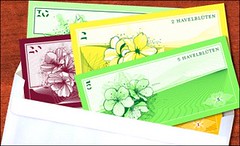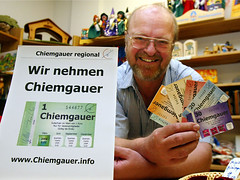
PREV ARTICLE
NEXT ARTICLE
FULL ISSUE
PREV FULL ISSUE
ON GERMAN MICRO-CURRENCIES
Local currencies have sprouted up all around the U.S. and the world in recent years. Dick Johnson forwarded this page from National Public Radio (soon to be known simply as "NPR") about some micro-currencies in Germany. As a radio program the web page is basically just a transcript of the show and isn't illustrated. But I found an image of one of the German currencies (the Havelbluete) elsewhere on the web.
-Editor
WESTERVELT: Artisanal pork and organic fruit and vegetables aren't the only locally made products exchanging hands. The regional currency, the Kingower is as well. Walburger Zanbugler(ph) is a local beef and pork farmer. At the front of her refrigerated stall, prominently displayed near the regional delicacy, Weisswurst, a sign in German reads, Kingower accepted here. Ms. WALBURGER ZANBUGLER: (Through translator) I think it's a great initiative because it means that the money stays within the region. It's a kind of a give and take principle. So when I take the Kingower here, I also spend the currency here. That's the main reason why I take part. WESTERVELT: The currency, based on the Euro, one Kingower equals one Euro, is printed locally. It aims to promote regional investment while also helping the community. It's not backed by any government body. But what used to be illegal gray area is now legal tender here. The Kingower, named after a region in Bavaria, is a depreciative currency. It loses two percent of its value at the end of each quarter. So that encourages people to spend, something the frugal Germans are notoriously unwilling to do. If you don't use it fast, the currency has to be topped up by purchasing a dated stamp. Sixty percent of the fee you pay to bring the currency back up to full value goes to local nonprofit groups. The currency is now accepted in more than 600 regional businesses from banks to bread shops. And Andrea Sturzel's(ph) information technology company in Rosenheim. Mr. ANDREA STURZEL: You are forced to spend money, its quite good thing. It's very easy to say I change 100 Euros in Kingower and I can spend it within two or three weeks. I can pay a doctor in Kingower. I can pay an architect in Kingower. Most pharmacies in the region you can pay in Kingower. WESTERVELT: Local currencies such as the Kingower, the Havelbluete and the Nogle(ph) have been around for nearly eight years, almost as long as the Euro. In all there are now some 60 local currencies up and running or planned for Germany. Now, if there's a Euro-skeptic, Germany-first tinge to these local currencies, or even some nostalgia for the good old days of the Deutschmark, most people here deny it. Local currency organizers see themselves as progressives who are softening the hard edges of a global economy. One of the program's partially subsidized by the Kingower's profits is an after school club. To read the complete article, see: Fiscal Localism On Rise In Germany (www.npr.org/templates/story/story.php?storyId=128546325&sc=emaf)
Dick Hanscom also noticed this item, but he located a related web page with a narrative story. This one has some illustrations.
-Editor
But the 40-year-old isn't paying with euros. The bar also accepts chiemgauer, the thriving local currency named after a region in Bavaria. The alternative currency is not some gimmicky fundraiser. It may look a little like Monopoly money, but the chiemgauer is real. One chiemgauer equals one euro. It's been around for eight years, almost as long as the euro, the common currency now used by 16 of the 27 EU members. Gelleri, a high school teacher who established the chiemgauer, is proud that more than 600 regional businesses — from drugstores to architects — now accept the microcurrency.
To read the complete article, see:
From Stalwart To Skeptic, Germany Rethinks EU Role
(www.npr.org/templates/story/story.php?storyId=128462416)
The Numismatic Bibliomania Society is a non-profit organization promoting numismatic literature. See our web site at coinbooks.org. To submit items for publication in The E-Sylum, write to the Editor at this address: whomren@gmail.com To subscribe go to: https://my.binhost.com/lists/listinfo/esylum All Rights Reserved. NBS Home Page Contact the NBS webmaster 
|

